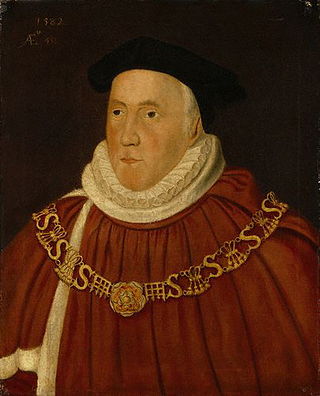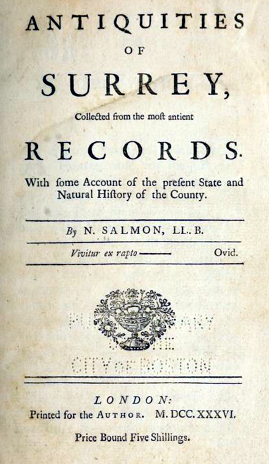Related Research Articles
Sir Simonds d'Ewes, 1st Baronet was an English antiquary and politician. He was bred for the bar, was a member of the Long Parliament and left notes on its transactions. D'Ewes took the Puritan side in the Civil War. His Journal of all the Parliaments of Elizabeth is of value; he left an Autobiography and Correspondence.

Matthew Wren was an influential English clergyman, bishop and scholar.

Sir Christopher Wray was an English judge and Chief Justice of the King's Bench.

Sir John Dodson was an English judge, aka Dean of Arches, and member of parliament.
Philip Broke, of Broke Hall, Nacton, Suffolk, was an English landowner and Tory politician who sat in the House of Commons from 1730 to 1733.

D'Ewes Coke was rector of Pinxton and South Normanton in Derbyshire, a colliery owner and philanthropist.

Joseph Beaumont was an English clergyman, academic and poet.

John May (Meye) was an English academic and churchman, who became Bishop of Carlisle. He also served the House of De Vere as cleric in Buckinghamshire.
John Mapletoft (1631–1721) was an English clergyman and physician.
Arthur Ingram, 3rd Viscount of Irvine was an English Member of Parliament and peer. He was the Vice-Admiral of Yorkshire and Member of Parliament for Yorkshire and Scarborough. He was the father or grandfather of all the later Viscounts Irvine.
Sir Robert Wroth was an English politician.
Charles Berkeley, 2nd Earl of Berkeley, KB, PC, FRS was a British nobleman and diplomat, known as Sir Charles Berkeley from 1661 to 1679 and styled Viscount Dursley from 1679 to 1698.

The d'Ewes Baronetcy, of Stowlangtoft Hall in the County of Suffolk, was a title in the Baronetage of England. It was created on 15 July 1641 for the antiquary and politician Sir Simonds d'Ewes. He was the son of Paul d'Ewes (d.1624), whose mural monument with a kneeling effigy survives in Stowlangtoft Church, one of the six Clerks in Chancery. The title became extinct on the death of the 4th Baronet in 1731.

William Stanton (1639–1705) was an English mason and sculptor. He is known particularly for monumental masonry. He is often ferred to as Stanton of Holborn.

Edmund Withypoll, Esquire, of London, of Walthamstow, Essex, and of Ipswich, Suffolk, was an English merchant, money-lender, landowner, sheriff and politician, who established his family in his mother's native county of Suffolk, and built Christchurch Mansion, a distinguished surviving Tudor house, as his Ipswich home.

NathanaelSalmon was an English antiquary who wrote books on Roman and other antiquities to be found in the south-east of England. He was not well respected as a scholar in his time or subsequently, but he was industrious and well travelled, and he recorded many local customs and much folklore.
James Calthorpe of Ampton who was Sheriff of Suffolk, in 1656, during the Protectorate of Oliver Cromwell, by whom he was knighted at Whitehall, 10 December, in the same year.

Sir Edward Lewknor or Lewkenor was a prominent member of the puritan gentry in East Anglia in the later Elizabethan period, and an important voice on religious matters in the English Parliament.
Walter Plumer, of Cavendish Square and Chediston Hall, Suffolk, was a British Whig politician who sat in the House of Commons between 1719 and 1741.
Sir Richard Allin, 1st Baronet (c.1659–1725), of Somerleyton Hall, Suffolk, was a Whig politician who sat in the House of Commons from 1709 to 1710.
References
- 1 2 3 4 5 6 Stephen, Leslie, ed. (1886). . Dictionary of National Biography . Vol. 6. London: Smith, Elder & Co.
- ↑ "Bowes, Paul (BWS650P)". A Cambridge Alumni Database. University of Cambridge.
- Attribution
![]() This article incorporates text from a publication now in the public domain : Stephen, Leslie, ed. (1886). "Bowes, Paul". Dictionary of National Biography . Vol. 6. London: Smith, Elder & Co.
This article incorporates text from a publication now in the public domain : Stephen, Leslie, ed. (1886). "Bowes, Paul". Dictionary of National Biography . Vol. 6. London: Smith, Elder & Co.